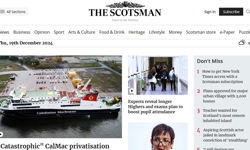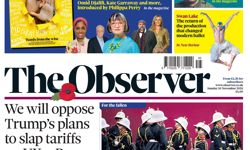The lunch with Lawson Muncaster, co-founder and managing director of City A.M. on Tuesday, March 10th 2009 at traditional City restaurant Sweetings, was memorable for more than one reason.
The larger-than-life Scot Muncaster, who has been dubbed Lunchmaster, and who would later abseil down the face of the Lloyd’s building for charity to mark City A.M.’s tenth anniversary last year, was in an ebullient mood about the future of the newspaper he helped to create.
After more than three years, the specialist City of London daily was heading rapidly for profit, he claimed. Distribution would soon be extended to Edinburgh, Manchester and Leeds and there was even talk about eventually taking the “free” newspaper to Moscow, Mumbai and New York.
But what made the lunch truly memorable was Muncaster’s tip for the Champions Hurdle at Cheltenham that afternoon.
Punjabi, said Muncaster. Punjabi he emphasised, heavily implying that the tip had come virtually from the horse’s mouth.
Punjabi came in at 33-1.
“It was my first cash bet at the bookies - £25 each way. I didn’t really know horse racing at all,” claims Muncaster who added that the paper was launching betting coverage and he wanted to experiment.
The big win against the odds seemed perfectly symbolic. Lawson Muncaster was on a roll and had already answered doom-mongers predicting the new City daily would be lucky to last for weeks.
Reality bites
Muncaster is a wiser and more realistic newspaper executive now.
He was soon forced to acknowledge that there wasn’t the advertising volume to support distribution in Edinburgh, Manchester and Leeds and Moscow, Mumbai and New York was lunch talk that soon disappeared from the narrative.
City A.M. distributes more than 100,000 copies a day, 50 per cent picked up in London and the rest from the railway stations feeding City workers into London. It is an M25 publication, the executive who began work as an advertising sales executive at Scottish Television and still lives in Scotland, concedes.
Despite the limited print distribution, Muncaster realised that business people in Edinburgh, Manchester and Leeds would be interested enough in the City of London to click onto cityam.com, a website that has seen considerable growth.
The City A.M. managing director says unique monthly visits have risen from 200,000 in January 2015 to around two million now.
The bite-sized articles in the publication, designed to give its City constituency a 10-minute briefing on the way to work, are anyway almost print versions of the internet.
In the month of its 11th anniversary (September), City A.M. can celebrate the remarkable feat of surviving and expanding, although profitability remains a future target.
The latest financial figures published in November show that in 2014, City A.M. had an increased pre-tax loss of £624,919 although its five directors including Muncaster and fellow co-founder Jens Torpe were together paid £539,000. The company owed £3.6 million to creditors due within one year and £6.6 million within five years.
If he had known then what he knows now, that City A.M. would have to confront a recession in its early days and cope with difficult times for print advertising throughout its life, would he have still gone ahead?
“Two thousand times, yes,” Muncaster insists, adding that a brand has been built and City A.M. understands the dynamic of the City of London, has a feel for the Corporation of London, the FTSE and the political context of the City.
“I am very proud. I think we have created a brand that will be here forever,” says Muncaster, who acknowledges that “forever” is a long time.
It is perhaps just as well, therefore, that the main lesson an impatient man has learned from the past decade - is the virtue of patience.
“When I first launched the business, I was very American driven - three month reporting on what we were doing. When it’s your own business, you try to achieve something which is quite unique. For that you have got to be a little more patient. If it’s one thing I have learned over the past ten years, it is to be patient,” admits Muncaster.
Print rules
He is also as committed to the primacy of print as he was on day one, despite the vast changes that have occurred in the balance between print and online in the publishing industry.
“I am adamant that you still need a paper product to demonstrate integrity. If you think of all the big things that have happened in the past few years from MPs expenses to doping in the Tour de France, it has all been led by indigenous newspapers and although the online component can help, I still think you have to have that flag (print) to wave,” he says.
Indeed, the City A.M. executive believes some newspapers have over-emphasised the online component to the detriment of their print editions.
Though Muncaster is now patient, his patience is not endless and he believes that City A.M. is at a crossroads and will have to deliver on its promise and move into significant profit next year.
“I think it’s fair to say that if we don’t achieve that profitability in 2017, then I don’t think we have to blame the market. I think we have to blame ourselves because we are a decent business with decent products,” he insists.
Apart from newspaper, online versions and apps, the company has an events business and three glossy magazines delivered with the paper – Bespoke, Living and Money.
The company has stable shareholders who are also clearly patient too – Muncaster and Torpe, who is chief executive, and the company’s private Dutch investors.
Might a sale be on the cards at some stage, particularly if next year’s profitability target is not met?
“Obviously those dynamics exist in any marketplace and of course for us, we are not a bottomless pit of cash but by the same token, we are very strong in terms of shareholding. There are no quitters and we haven’t gone to shareholders and asked for more money in the past ten years,” claims Muncaster who insists that the business has been self-funded by the original £8 million commitment.
Revenue from January to June was up by three per cent before the Brexit vote helped to take July eight per cent down.
After the referendum vote, Muncaster believes there was a lot of “rabbits caught in the headlights” but he expects the City “to come back to school” in September and a new normality will resume.
Muncaster was a firm Remain voter but the paper decided against taking a firm stance, even though the City in general was almost certainly in the Remain camp.
“In early June, we decided that we had to prepare the City for either outcome so we were quite balanced. The paper was definitely down the middle. We are able to say this is how we move forward, although disappointing for me, it is what it is and we will crack on but the paper itself and Christian (City A.M. editor Christian May) to his credit was on that from the start,” says Muncaster.
New arrivals
The appointment of May, a senior public relations man, at the time director of communications at the Institute of Directors, to replace highly experienced business journalist David Hellier, who had been at City A.M. since the beginning, caused surprise.
May had a MA in broadcast journalism at City University but had never worked as a journalist.
Muncaster and Torpe clearly decided that “a fresh pair of eyes” was needed to take the paper forward and a large number of potential candidates were seen and rejected.
Muncaster was advised, by someone he respected greatly in the City, that he should approach May. A meeting was followed up by dinner that evening and May was offered the editorship on the spot.
It is believed the change of editorship happened without the founders making clear any dissatisfaction personally to Hellier, who now works for Bloomberg. His political instincts may not have been right-wing enough for an avowedly capitalist publication.
Other changes in direction in the past year have included the appointment of Charles Yardley from Forbes as chief operating officer.
Yardley has pioneered the policy of making space available for corporate interests to carry native advertising and other corporate material on the City A.M. website.
This month (September), City A.M. will launch “tenancy” agreements with three large companies to place their content on the newspaper’s website, although not in the paper itself.
In a controversial move, the companies will pay monthly rent in something that Muncaster sees as the media equivalent of Hugo Boss having an outlet in Selfridges.
“We thought long and hard about it. We heard about how much people spend on content yet they couldn’t place it anywhere apart from their own website,” says the City A.M. executive. He insists that although clients will be able to have access to City A.M. online readers, the corporate material will be clearly labelled as such.
City A.M. has also taken a leading stance in taking action against ad-blockers by blurring the text of stories for those using adblocking software on Firefox browsers.
Such users receive a message explaining why they are having trouble viewing articles.
“As City A.M. relies on advertising to fund its journalism, please disable any adblockers from running on cityam.com to see the rest of this content”, the message read.
But the biggest push of all is towards the promised land – profitability.
“We have got all our products in place. We now have to deliver some profits in 2017. It’s there for us to do and it’s the expectation of shareholders, the management, the company and everyone is focusing on that,” Lawson Muncaster re-emphasises.
Naturally he has a horse-racing tip this time too for a strong contender at Goodwood that day – Intelligent Cross.
Unfortunately, Intelligent Cross was no Punjabi and is still running.












